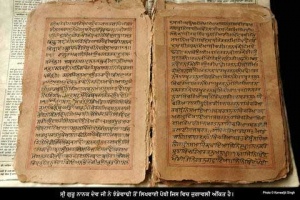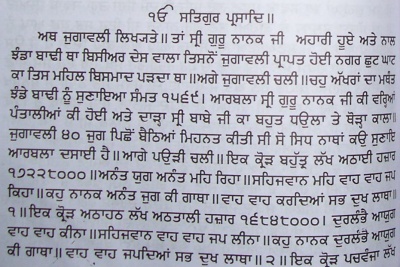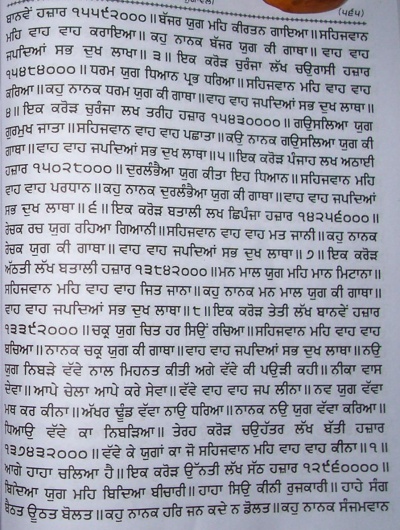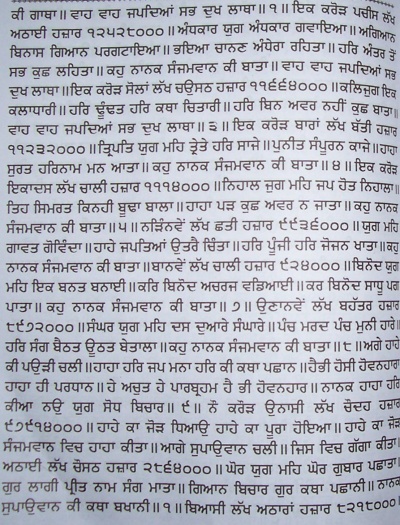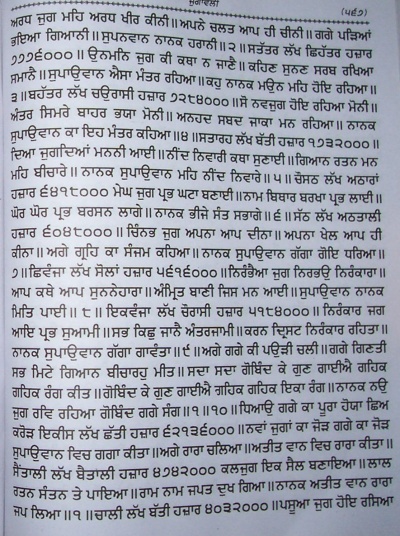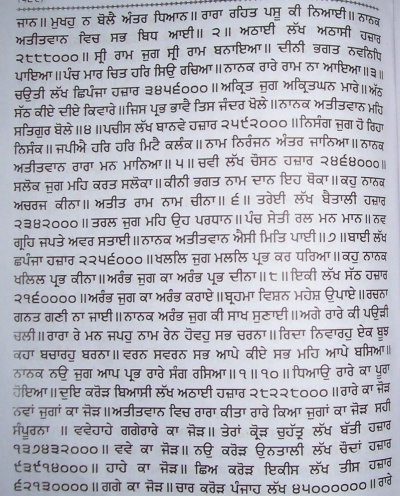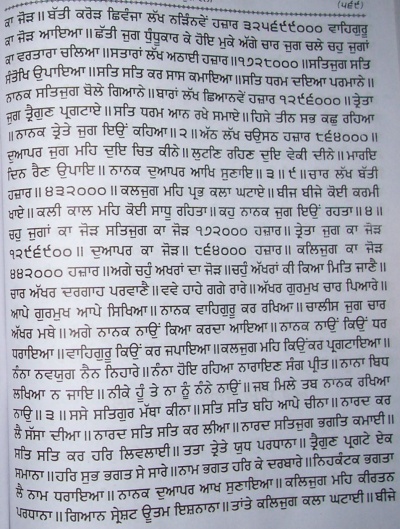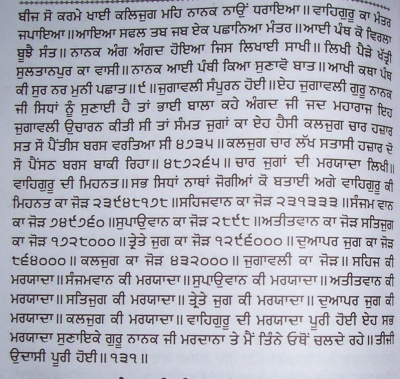Jugawali
Jugawali is the poem which is said to be narrated by The Guru nanak & Written by Bhai Jhanda Badhi. It is contained in Bhai Bala's Janamsakhi. Latest Reaserches shows that Jugawali is not written by Guru Nanak, it was written by niranjaniyas(Handalis). This poem is on the four ages of the world
History
The Guru, after his pleasant visit to Shaikh Brahm and his district, where he made several converts, proceeded to a country called Bisiar, probably the state of Bushahir in the Himalayas, where he was ill received. The inhabitants, deeming his presence pollution, purified every place he had stood on. One man alone, Jhanda, a carpenter, was found to treat him with hospitality. He took him to his house, washed his feet, and drank the water used for the purpose. While drinking, it was revealed to him that Nanak was a Guru. He joined him in his wanderings.
Guru nanak and his companions directed their steps to the East. They went to an island in the ocean where they could obtain no food. There the Guru composed the Jugawali, a poem (no longer extant) on the four ages of the world. Jhanda committed it to writing and circulated it, With the new composition in his possession he returned to his own country, leaving the Guru and Mardana to continue their pilgrimage.
Critisism
Story No 29 in Puratan Janamsakhi will greatly help to decide when this book was written, and is given below -
“Story No 29. Bisiar Country - Jhanda Badhi - Jugawali Guru Nanak Dev then left that place. Then came to Bisiar country. There no one would allow them to sit anywhere. Then Jhanda, the carpenter appeared, and took both the Guru and Bhai Mardana to his home. He washed the Guru’s feet and drank the foot wash. The Guru blessed him. He became the devotee and began to accompany the Guru. By the True Guru’s Grace. (written) Jugawali Mehla 1.
tit smai baitha sumandar ki brati meh. poan ahar kia, nalai jhanda badhi bisiar des ka, tis ko jugawali prapat hoei. jhanda nal nibhiya, nagar choth ghat ka. tit samai bismad parida tha. aagai jugawali chali.
satgur parsad. waheguru ki marjada. chaun akhran ka mathant. jug chaliha vich hoa. (40). chali jug baith mehnat kiti (41) agai pauri chali. eik karor bahtar lakh athaei hazar. 17228000. anant jug aitai jug anant meh rehaiya. sehaj van japtiya sabh dukh latha. (1) .....nanak tai angad hoa, joti jot milai. nanak aaei panth gun kaha sunaye. aaei panth ki katha sur nar na janat. Jugawali likh sanpooran hoei. bolo waheguru. satgur parsad. tab babay ki khushi hoei. tab jhanda badhi bisiar des ko bidha keeta. jande badhi ki munji bisiar des vich hai. kaljug char hazar sat sai paintes bars vartiya hai. 4735. kaljug reha char lakh sataei hazar doai saipaiyan baras rehya. chalis jug ki maryada sat likhi.... sat jug da jor 432000. chon juga ka jor 4302000. jugawali ka jor .... waheguru ki mehnat hoai prapat adi bisiar des kai nagar chatghat kai.”
We are to find out the time when this book was written by studying the above quoted story. By reading this story repeatedly, we find many strange things.
(a) The story teller claims that this story was written by Guru Nanak Dev. But we do not find such a thing in Guru Granth Sahib. Moreover, there is nothing in common between the Guru’s Word and this story. What is the idea of giving length of each yuga and what is their authenticity? In what way one gains in spiritual upliftment by such readings? There is no relation between Spiritual Knowledge and reading of such vague things, which convey no meaning. What a strange thing, there is the praise of Aaei Path of Jogis, stated to be uttered by Guru Nanak Dev, who outright rejected the way of Yoga System for spiritual upliftment. In reality this story has been introduced by some one else and is not that of the author of Puratan Janamsakhi.
The question arises, how this “Jugawali” got inserted in this book. We shall solve this question in the next section. In the meantime we shall see what part of this story pertains to this book and what part has been intruded into it. In the beginning it is stated that Guru Nanak visited a part of the country, where no one would allow him to sit anywhere. Then came a Carpenter, named Jhanda. He took the Guru to his home. Jhanda developed so much of affection for the Guru, that he accompanied the Guru in his visits to other parts of the country. Thereafter, surprisingly, begins a strange description, which has no relation to the story whatever. The words used are “Siri Satgur Parsad. writing Jugawali - Guru Nanak Dev.”
The story of Jhanda Badhi is also included in Bala’s Janamsakhi - see page 97. There are some changes in this story. In Bala’s version, it is stated -
“The Guru, while traveling, reached Bisiar country. There no one would allow the Guru to sit down any where. The Guru went out and there sat down. Jhanda Badhi saw that three saintly people had come. Jhanda then made obeisance to the Guru. Then jhanda told his wife that Saints had come, and that they should serve them with food... The Guru was much pleased with Jhanda... Jhanda was engaged in meditating on God. Jhanda became so much absorbed in God’s love, he began roaming in a detached way...” (97)
We have seen that the real story of Jhanda Badhi in both the Janamsakhis was the same. The “Jugawali” portion has been the later addition.
(b) In Jugawali there is a mention that “Kal Yug - Iron Age” has completed 4,735 years. It appears this is referring to some event that has taken place. There is difference of 3,100 years between the Age of Kal Yug and the Christian Era. If we subtract from Age of Kal Yug, the C.E. difference, we arrive at 1635 A.D. - that was the time of Guru Hargobind, the Sixth Guru. It is quite apparent that this had no relation to “Jugawali”, and that some one has taken from somewhere and put it here. This cannot be Guru Nanak Dev’s Composition, as this shows the year 1635 A.D., while the Guru’s demise took place in 1539 A.D. In fact this date was given at the end of Puratan Janamsakhi, stating when this book was written. Some one removed this date from the end of the book and put it in Jugawali. We shall further deal with this later.
This story we have already narrated. Stories Nos. 129, 130 and 131 in Bala’s Janamsakhi are also relevant. In Bala’s Janamsakhi it is written -
“eik Onkar satgur parsad ab jugawali likhitatai. ta siri guru nanak ji paonhari hooai. nal jhanda badhi tha bisiar des wala. eis noo jugawali prapat hoei. nagar chut ghat ka, tis mehal bismad parhda tha. atai jugawali chali. chaon akhran ka mathunt jhandai badhi noo sunaya. samat 1569. arthla siri guru nanak dev ji ki variya puntalia ki hoei darha siri siri babay ji ka boat dhola tai thora kala. jugawali...
aaiya safal tab jab jab eik pachaniya munt. aaei panthi katha ko ko birla boojhai sant. nanak agai angad hoya jis likhaei sakhi. likhi pairhe khatri sultanpur ka vasi. nanak aaei panthi kia sunavai bat aakhi katha panth ki, sur nar muni pachat. yugawali sampuran hoei, eh yugawali guru nanak ji sidha noo sunahi hai. ta bhai bala kehai, guru angad ji! maharaj eh jugawali ochran kiti si samat yuga ka eh hosi. kalyug char hajar sat sai paitis bars vartiya si 4735 ...” (131)
Only then consider coming here is fruitful, when we realize One in our mind. This is the story of Aaei sect of jogis, rare is the saint who realizes this. Nanak was succeeded by Angad, who wrote this Story in 1635 A.D. It was written by Pairha Khatri, resident of Sultanpur. Nanak created Aaei sect, listen ye people. Yogawali has been completed . This Jugawali was narrated by Guru Nanak to jogis. This is said by Bhai Bala to Guru Angad. Then Guru Angad narrated Yugawali in Samat 4,735 - means 1635 A.D. (THIS IS THE DATE OF TIMES OF GURU HARGOBIND, 6TH GURU. GURU NANAK’S DEMISE TOOK PLACE IN 1539 A.D. THIS CLEARLY PROVES INTERPOLATIONS BY NIRANJANIAS TO CORRUPT SIKH RELIGIOUS BOOKS. THEY WERE BLIND ENOUGH TO THIS DATE. THEY HAVE BEEN CAUGHT IN THEIR OWN NET). THIS IS THE ADDITION THEY MADE IN PURATAN JANAMSAKHI.
References
- Bala JanamSakhi
- Max Arthur Mcauliffe, The Sikh religon
